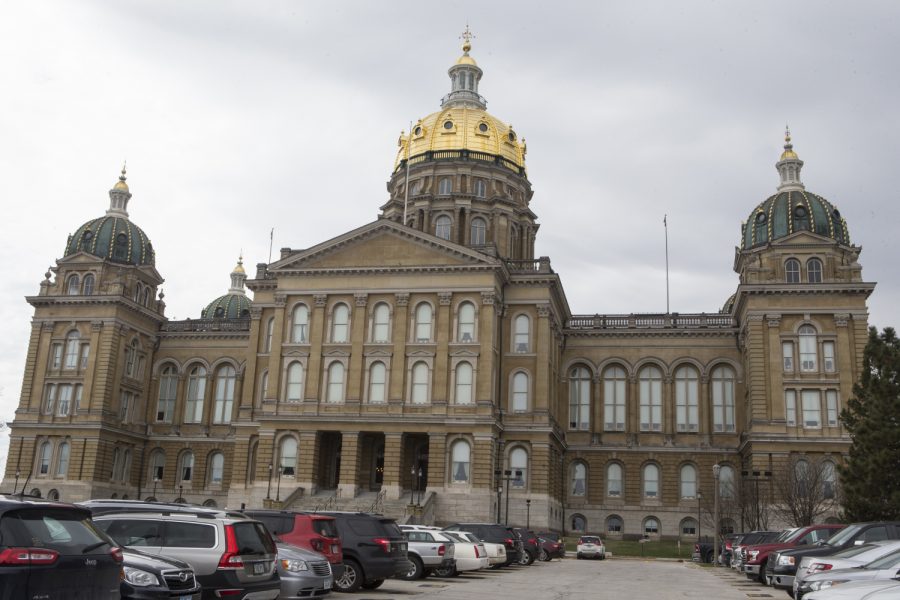Opinion: Lawmakers should check Iowa governor’s emergency powers
In many states, the novel coronavirus has been used to justify frivolous executive power grabs. Let’s make sure that never happens in Iowa.
The Iowa State Capitol building is seen in Des Moines on April 9, 2019.
April 21, 2020
On the morning of St. Patrick’s Day, Iowa Gov. Kim Reynolds issued a mandate for all bars and restaurants to stop serving dine-in customers by noon. In the month since, that order has been maintained and expanded to include more businesses.
What’s troubling is that the input of our state Legislature was not sought, nor was it required. She has the authority to issue such orders under Iowa Code Chapter 29(6). Under state law, the Iowa Legislature has the power to rescind her orders, but that clause is unlikely to be invoked except in extreme circumstances.
Iowa needs a more pre-emptive check on the governor’s emergency powers. Fortunately, the restrictions Reynolds issued have generally been reasonable, unlike those from some of her counterparts.
For example, Kentucky Gov. Andy Beshar directed Kentucky State Police to record the license plate numbers of anyone attending Easter church services so that local health officials could show up at their homes to issue quarantine orders. Discouraging church services during a pandemic is fine, but the way he went about it seems a bit Orwellian.
A pandemic does not necessitate abandoning our republican form of government for months at a time. It may be unsafe for the Legislature to convene right now. However, it is safe for members of the General Assembly to meet in private Zoom sessions — as so many of us have been required to do for our classes.
In Michigan on April 9, Gov. Gretchen Whitmer banned the sale of nonessential items such as gardening materials and restricted visits to other residences, with exceptions such as caring for a relative, elderly friend, or pet or visiting a nursing home. She also banned boating, but only for boats with motors.
These restrictions are absurd and even dangerous. No one should ever need state permission to check on a neighbor or family member. Forbidding the sale of nonessential items in stores such as Walmart that are open anyway is excessive. Someone might need a pair of headphones to drown out their loud roommate, a book to read, a birthday present for their child, or anything else you can imagine. Fishermen going out on their boats pose no risk to public health.
The Republican-dominated Pennsylvania General Assembly provides a shining example of a proper response to gubernatorial emergency overreach. Republican state Rep. Mike Jones told a local NBC affiliate, WGAL, the process to apply for waivers to stay in business has been unfair and lacks transparency. Republicans there want to give county officials more autonomy over reopening decisions. The bill is unlikely to survive Gov. Tom Wolf’s veto, but it was a worthy effort.
This type of crisis is unique because it enables broad government oversight for such a long period of time. Most natural disasters don’t hurt the entire state, compelling governors to merely issue evacuation orders and dispense aid resources. Riots, such as those in Los Angeles in 1992, can typically be resolved within a matter of a few days.
During the Cold War the federal government built secret underground facilities where Congress could meet in the event of a nuclear fallout. It doesn’t seem like too much to ask for our state representatives to meet each other occasionally on Zoom to ensure the governor is not exceeding her proper authority.
The authority to shut down businesses and restrict the movement of every citizen for months at a time should not be vested in a single person. After this is all over (yes, there is light at the end of this tunnel) Iowa needs a new statute to rein in the governor’s emergency police powers. Any executive orders of the scope that Reynolds issued on March 17 should require the General Assembly’s approval to be extended beyond the first seven days.



